Because gut healing is hard (and confusing), today I’m assisting you with answering the question, “Can I eat these top 12 fall vegetables?”
I was reviewing my top 12 fall vegetables list when I remembered that, despite their goodness, they are not appropriate for everyone at all times.
It all comes back to gut health vs. gut healing.
My Top 12 Fall Vegetables
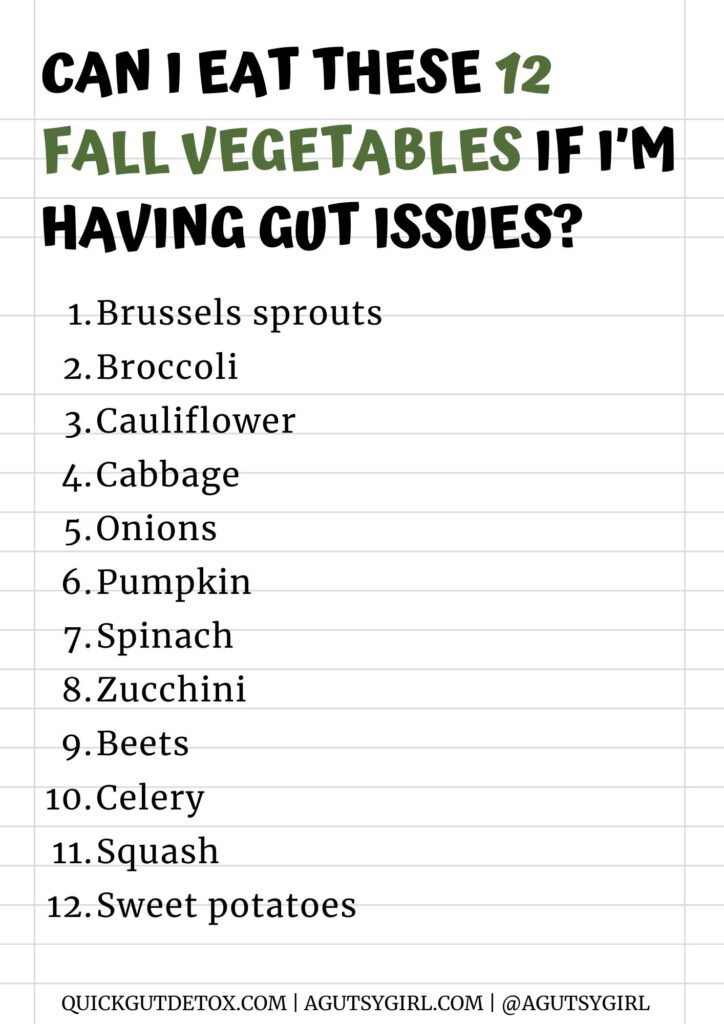
Of course there are many more fall vegetables; these are just my favorites.
- Brussel sprouts
- broccoli
- cauliflower
- cabbage
- onions
- pumpkin
- spinach
- zucchini
- beets
- celery
- squash
- sweet potatoes
But even though you might love them all, at all times they may not love you back.
And if you can’t, I remember exactly what that’s like so I want to help you drill down today.
Can I Eat These Top 12 Fall Vegetables?
Click HERE to save this post for later.
Note: This post is 100% for those of you who have IBS and/or IBD (or suspect one or the other or both).
If you have zero gut issues, my opinion is that you should never take these (or anything for that matter) out of your diet just because.
Trust me, that is a rabbit hole that once you start digging is hard to escape and can ultimately lead to gut hell.
Let’s break it down by vegetable….
Brussels Sprouts
At just 3, Brussels sprouts are moderate-FODMAP and at 4, they are high-FODMAP.
They contain Oligo-fructans, which always pass through the gut and escape digestion.
Brussels sprouts are also part of the cabbage family, so if you have problems with cabbage, these might pose problems as well.

Brussels sprouts are rich in protein, potassium and folate, as well as vitamins A and C, and when prepared correctly, can taste incredible.
My Roasted Coconut Cashew Brussels Sprouts are delish!
Broccoli
As kids, noses crinkle at the thought of broccoli.
That’s because parents don’t prepare it correctly.
You know how broccoli kills it?! When you soak it in Coconut Oil or Buttery Coconut Oil (dairy free, Vegan) and toss it with salt and/or spices + herbs.
Seriously, even my kids love it like that! Some of you might be able to tolerate pieces of, just not the whole, broccoli.
Something you might not be aware of is that if you eat only the broccoli head (top part) it’s low-FODMAP food (up to 2 2/3 cups when it becomes moderate).
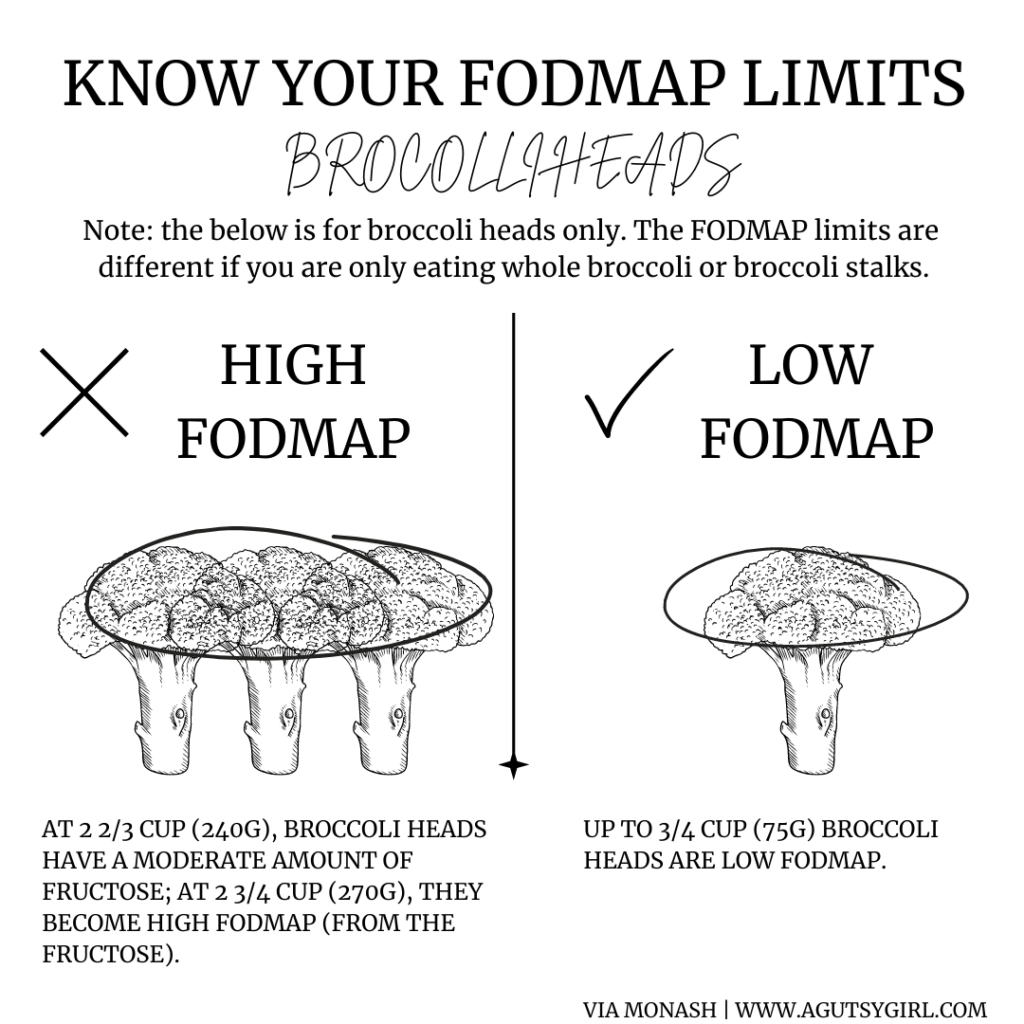
However, just 3/4 cup of the broccoli stalk makes it high-FODMAP. Broccoli stalks contain fructose, which is how it’s part of the FODMAP family.
Broccoli is also high in insoluble fiber, making it hard to digest.
Cooking it could help some.
One of the best and easiest broccoli recipes I have is my Roasted Broccoli with Lemon Vinaigrette which can be found on page 136 of The Leaky Gut Meal Plan.
Cauliflower
(Side note: this whole post idea came about from this fall vegetable, after a review of the post, “How to Make Gluten Free Mashed Cauliflower Potatoes.” Click HERE to read it).
Cauliflower has become trendy in the low-carb (and weight loss) community as a substitute for white potatoes and rice.
It might have even been part of your New Year’s Resolution swap.
And with that, you might have become more bloated than ever. One reason is that at just 3/4 cup, cauliflower contains polyols, a FODMAP.
It is a cruciferous vegetable, which is high in fiber.
Cabbage
Cabbage is another vegetable that is high in insoluble fiber (soluble = soft and sticky; absorbs water + insoluble = “roughage,” doesn’t dissolve in water).
If you have digestive problems, insoluble fiber can be a problem because it isn’t broken down by the gut and absorbed into the bloodstream.
However, if you do okay with insoluble fiber, cabbage could work for you, as most varieties are in fact low-FODMAP.

Choose: common, red, and Chinese cabbages for a low-FODMAP option (I love it sautéed in coconut oil and Coconut Aminos).
At just 1 cup of Savoy Cabbage, though, you’ve entered high-FODMAP territory. Simply avoid that variety.
Onions
Ahhhhh…..onions. Such a lovely fall vegetable that is seemingly in everything, silently killing hearts of the SIBO community everywhere.
Oh wait, just me?! But yeah, if your SIBO is active, you probably can’t do onions because they are high-FODMAP due to Oligo-fructans (as the Brussels sprouts above).
You can, however, do the tops (only) of a green spring onion, which are low-FODMAP (and when my SIBO was active, I did this all the time).
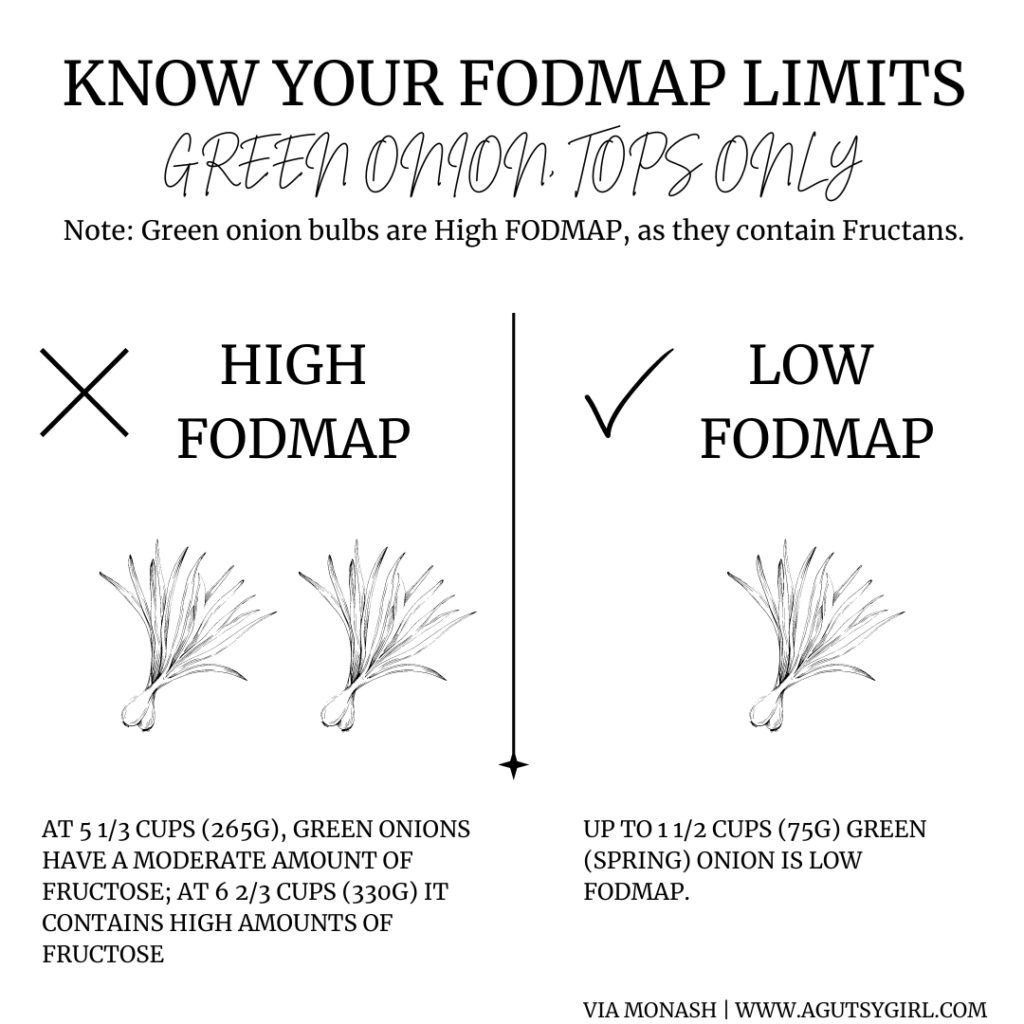
Pumpkin
Whether or not you can tolerate pumpkin depends on the type of pumpkin you are consuming.
Japanese Pumpkin, Pumpkin seeds, and canned Pumpkin are all low-FODMAP, so most people can handle them without effect.
Butternut (squash) Pumpkin has to be limited to 1/3 cup because at 1/2 cup it contains both Oligos and Polyols and enters moderate-FODMAP territory; 2/3 cup and you’re at high-FODMAP.
That said, one thing that I think is tricky is that many recipes (even like my Pumpkin Spice Latte), uses canned Pumpkin.
According to the kitchn,
Canned pumpkin is actually made from one or more types of winter squash, like butternut, Hubbard, Boston Marrow, and Golden Delicious.
If that’s true, then that’s likely the reason that if you sit down and scoop a ton of canned pumpkin into a dish, add some spices and whatever else (thinking it’s low-FODMAP), it might not agree with you.
Perhaps there is too much Butternut in your random helping. Your best bet is to choose the freshest pumpkin you can find, bake, then puree it. (I know. So. Much. Work. But if you love pumpkin as much as I do, it might be worth it.)
GET HELP BREAKING YOUR FOOD DOWN WITH….
BREAK DOWN
I was diagnosed with gastroparesis after being put on the ever-popular Ozempic for my diabetes about 4 years ago. My digestion has never been the same. I have suffered so much. Until I found this product. It has been a God-sent miracle and has saved my life. I can eat and digest many foods that I previously could not. Thank you so much for this wonderful product. – Deanne D. (from Shopify)
Spinach
Spinach is low-FODMAP, and I have never had a problem with it. It’s one of my trusted greens, no matter what. That said, for many people it is problematic.
One reason is that spinach contains oxalic acid, which is an antinutrient. Among the many problems that have been found with oxalic acid, the main issue for those with IBS and/or IBD is that your gut determines is absorption.
If you don’t have the appropriate bacteria in your gut, it can cause issues because the oxalates will not break down appropriately.
Finally, spinach does contain a lot of fiber and roughage, making it difficult for many to digest as well (preparation methods can help combat this).
Zucchini
Zucchini is probably one of the “friendliest” foods on this fall vegetable list.
It only becomes moderate-FODMAP at 1/2 cup (chopped) when it then contains Oligo-fructans.
Most of the zucchini’s nutrients are found in the skin, but that’s also where the fiber and roughage are contained as well.
In A Gutsy Girl’s Bible, zucchini is definitely on the “Yes To” list with note: de-skin and de-seed.
I also mention in the book,
I enjoy making zucchini and green beans doused in Nutiva Organic Liquid Coconut Oil with Garlic, but before sautéing the zucchini, I take all the skin off. Yes, normally you should try to eat the skins – that’s where the fiber lies – but during a SIBO flare up, you’re not trying to add any extra fibers to feed bacteria.
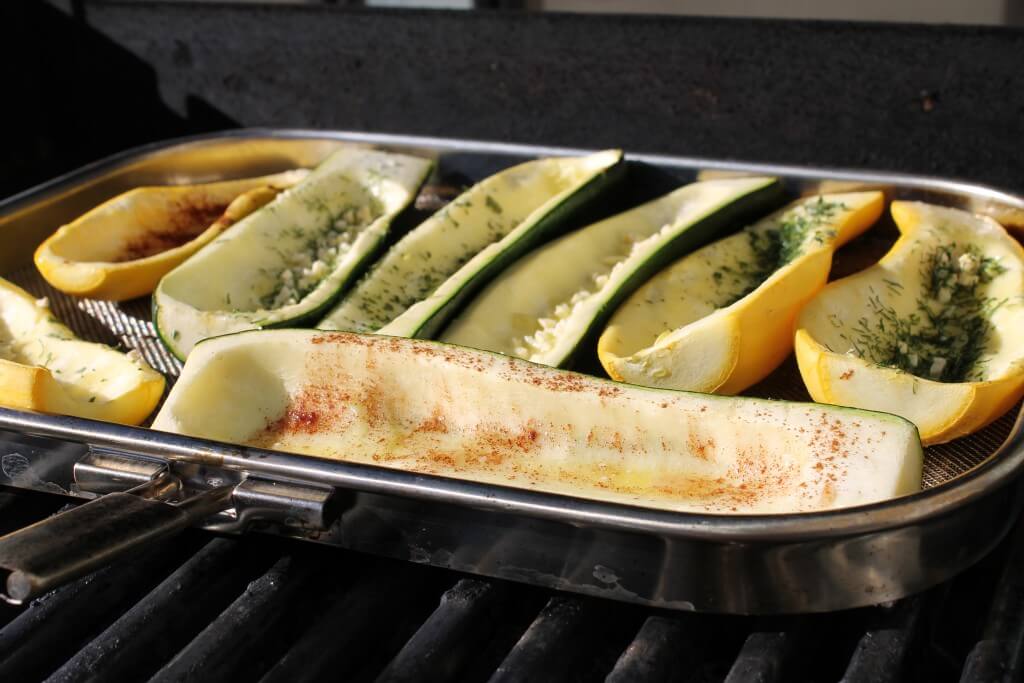
Beets
Growing up, beets were one of the grossest foods I ever had (that and Mr. Squash below).
Today, I love them.
But if you are Gutsy, you’ll need to tread lightly.
Beets are high-FODMAP at just 1 small beet or 1/2 of a large.
Again, it contains the Oligo-fructans.
However, if you do not have SIBO, you might want to add more beets into your diet because they bleed some impressive benefits.

Celery
Celery is the fall vegetable that might be as basic and simple as they come; unsuspecting.
However, at just 1/3 of a medium stalk it becomes medium-FODMAP; at 2 medium stalks, high-FODMAP.
Celery contains Polyols, which can cause stomach discomfort (they are a natural and added sugar).
Polyol-mannitol should be avoided, too, if you malabsorb mannitol.
Squash
Most varieties of summer squash are good to go for those with IBS and/or IBD.
Winter Squash is an entirely different story. Rather than re-hash the fall vegetable, you can review a post I wrote on it in 2013, “Wicked Winter Squash with IBS and IBD” to learn all about it.
Sweet Potatoes
And last, but certainly not least, the fall vegetable that typically has the most question marks around: Sweet Potatoes.
We are constantly being told to eat all the Sweet Potatoes; that we should choose them over White Potatoes because they are “so healthy.”
I’m not here to tell you they aren’t healthy (because they are).
What I’m here to tell you is that this search, “Why Can’t I Digest Sweet Potatoes?” is one of the most common ways people who have never been to my blog stumble here for the first time.
Read that post, and then also read “5 Reasons Why You Might Not Be Able to Digest Sweet Potatoes.”
You’ll fully understand then.
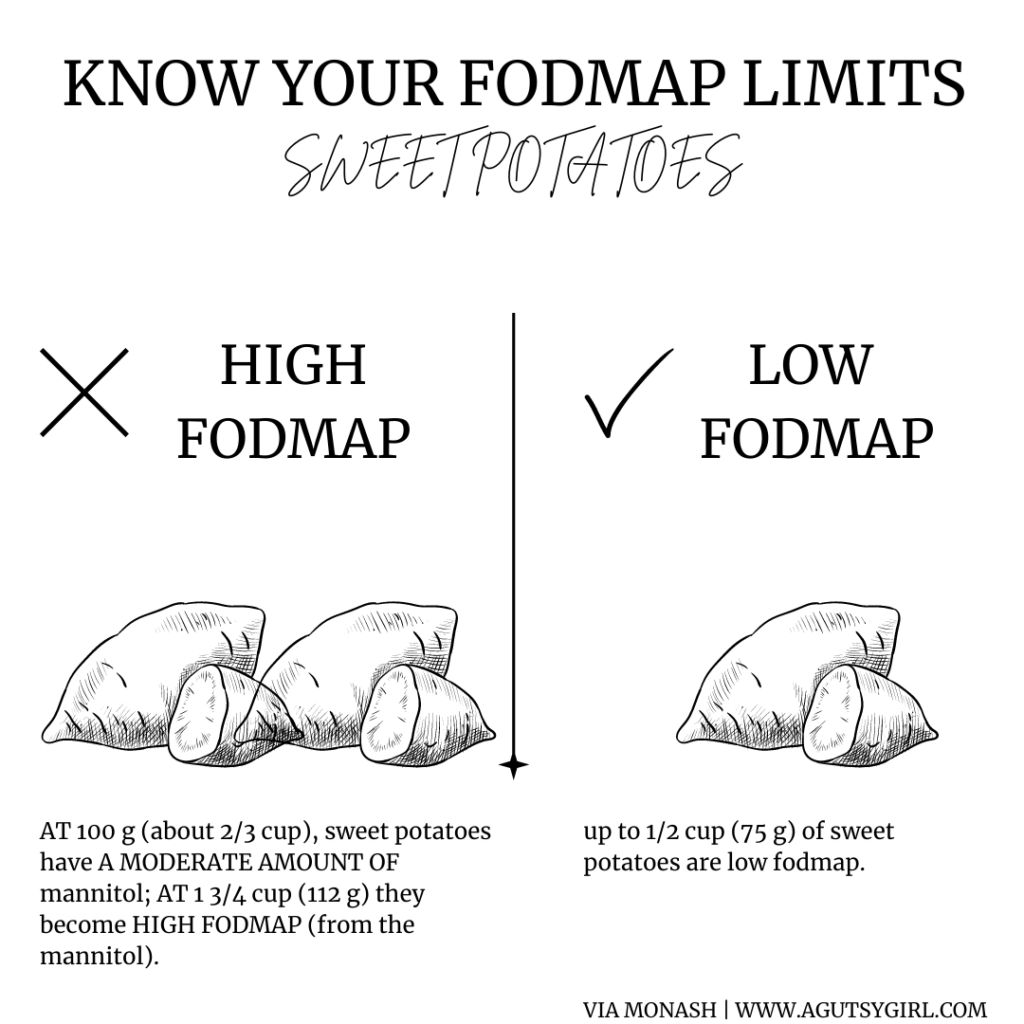
Fall Vegetables When You Have IBS and/or IBD
I get it and I get you. I know that all the vegetables in the world might not be for you; not now, not in this exact place on your gut healing journey.
Tell me: Of the fall vegetables on this list, which can you eat? Which can you not eat? Any favorites/least favorites?
If you liked this article on ‘can I eat these top 12 fall vegetables,” you might also enjoy:
Xox,
SKH
🤰 bloating be gone! weight loss through optimal gut health for women
💃ʜᴇᴀʟ ʏᴏᴜʀ ɢᴜᴛ. ʜᴇᴀʟ ʏᴏᴜʀ ʟɪfe.
🫶🏻 founder gutbyome.com

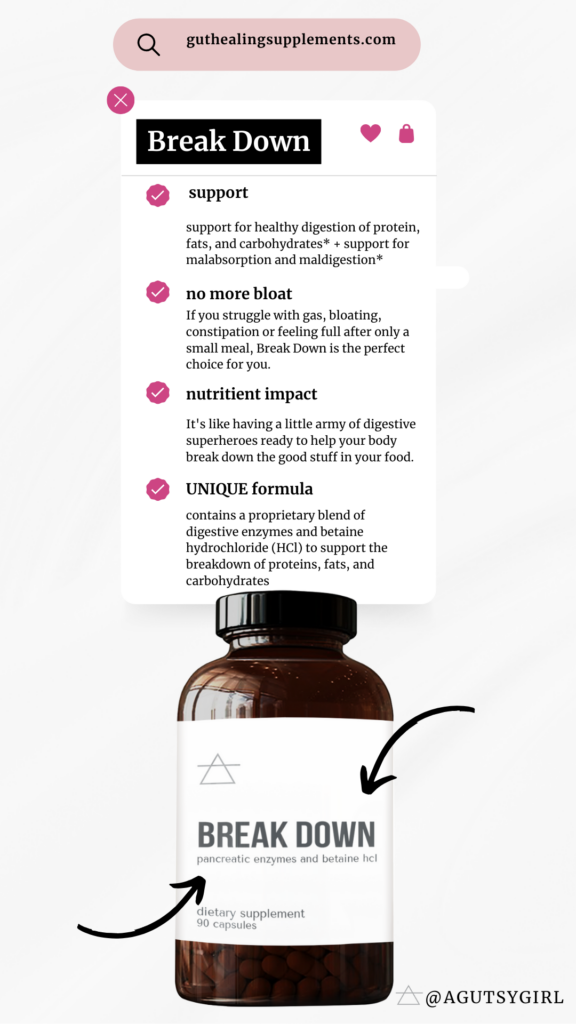
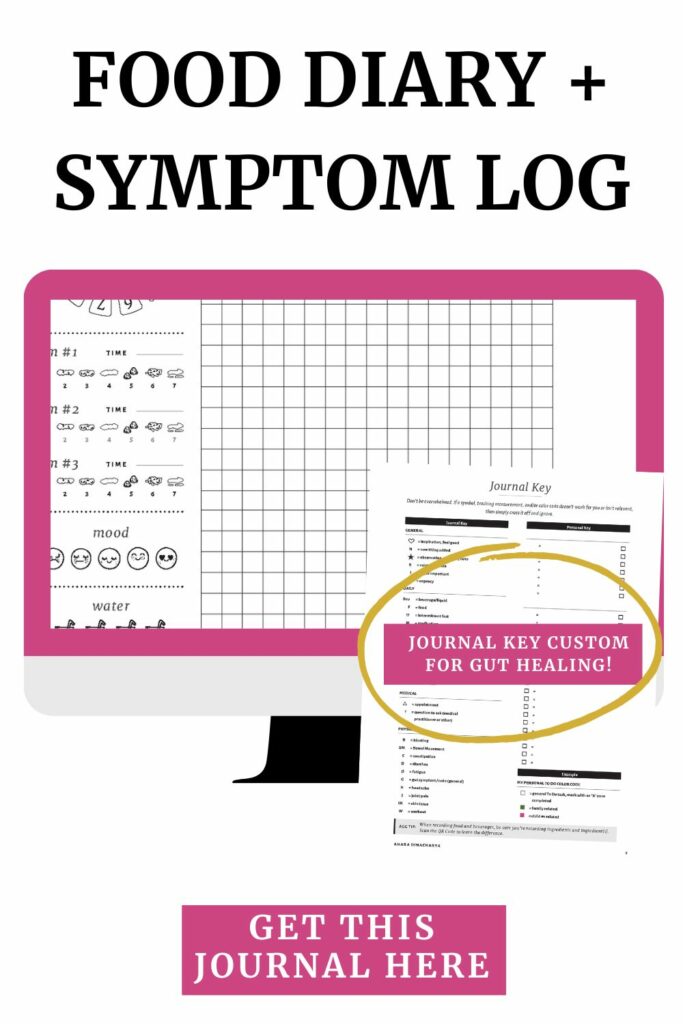
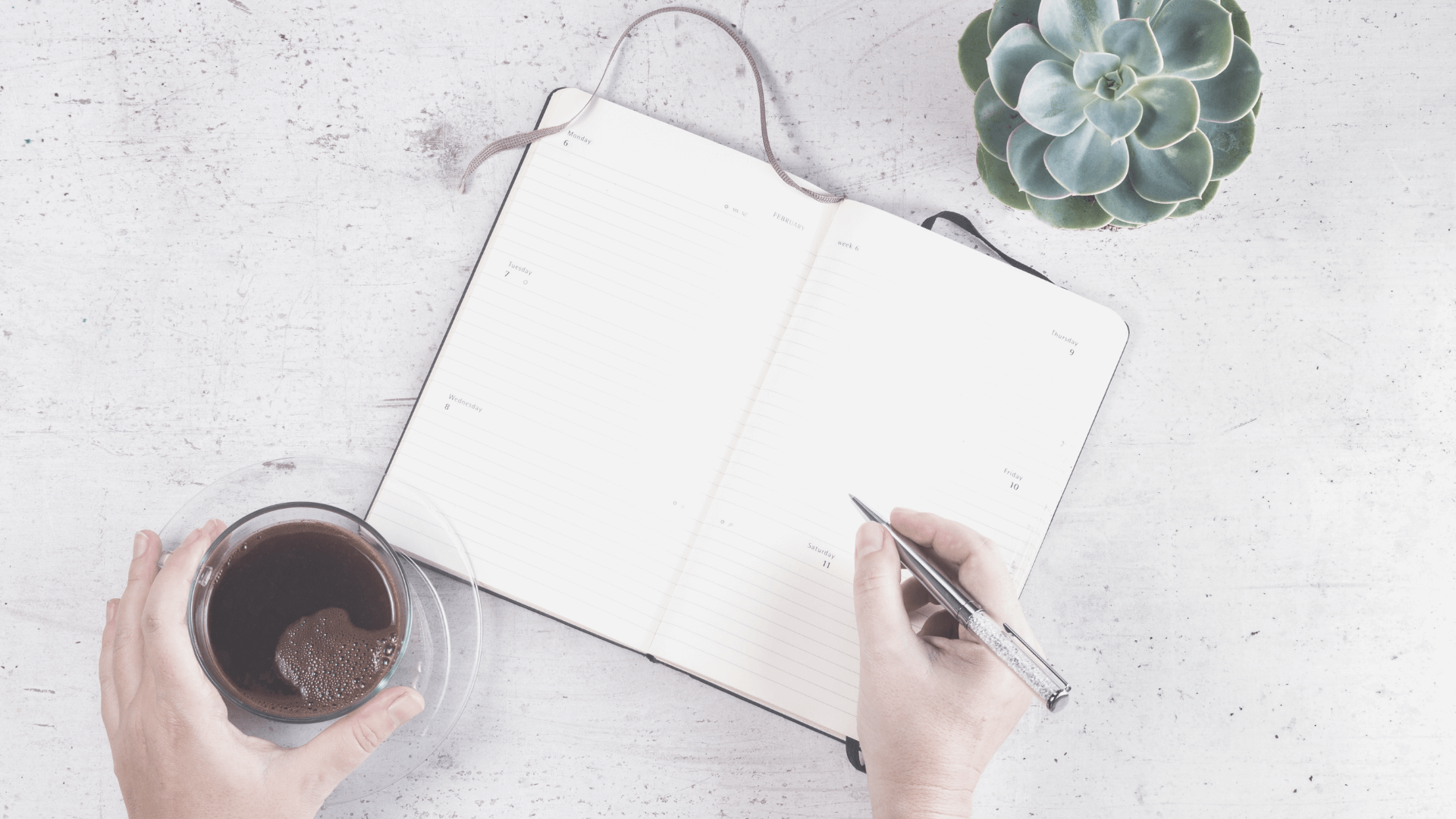
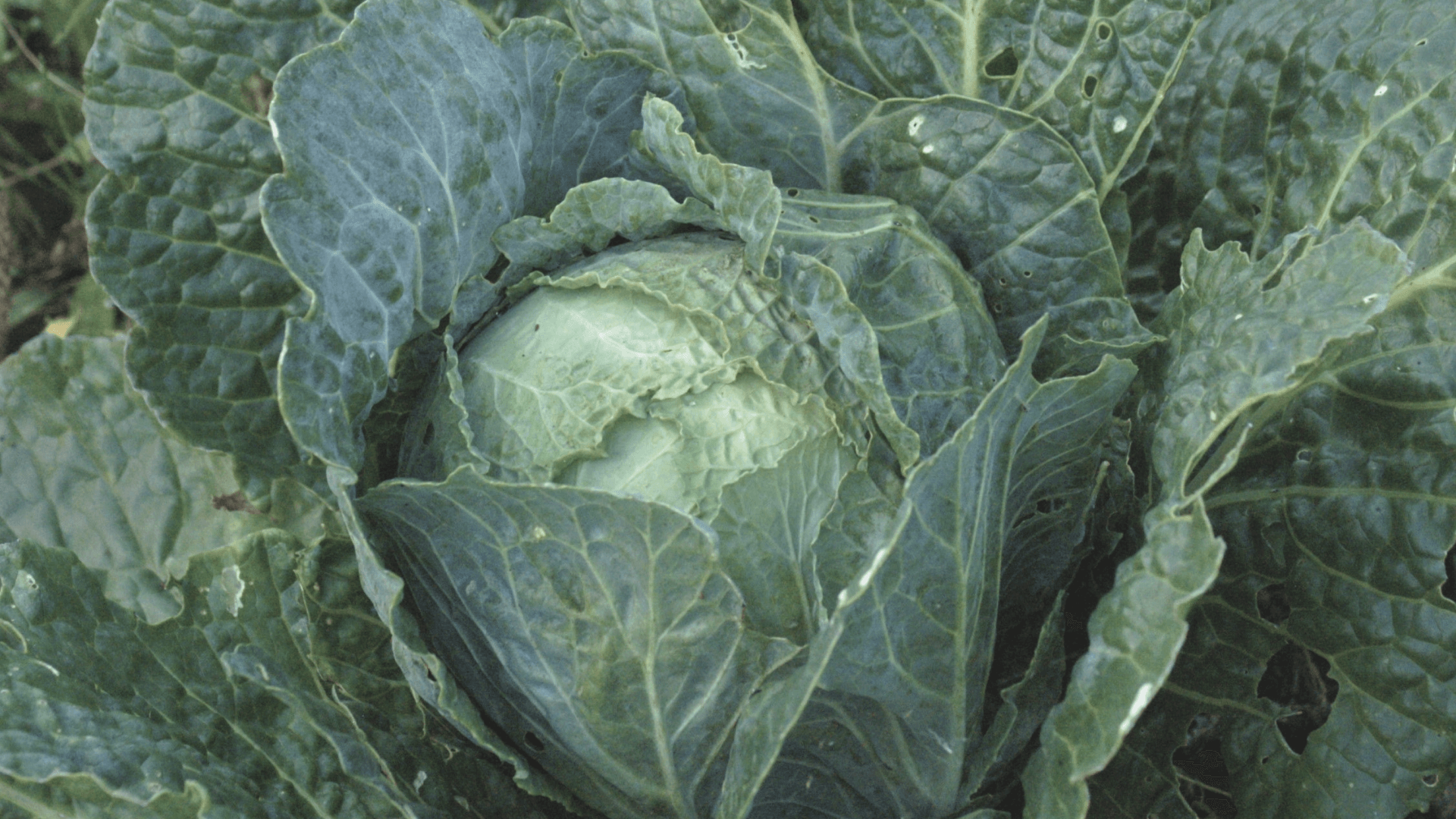
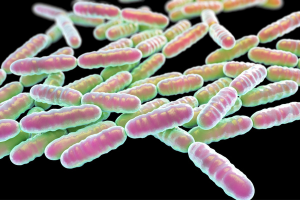
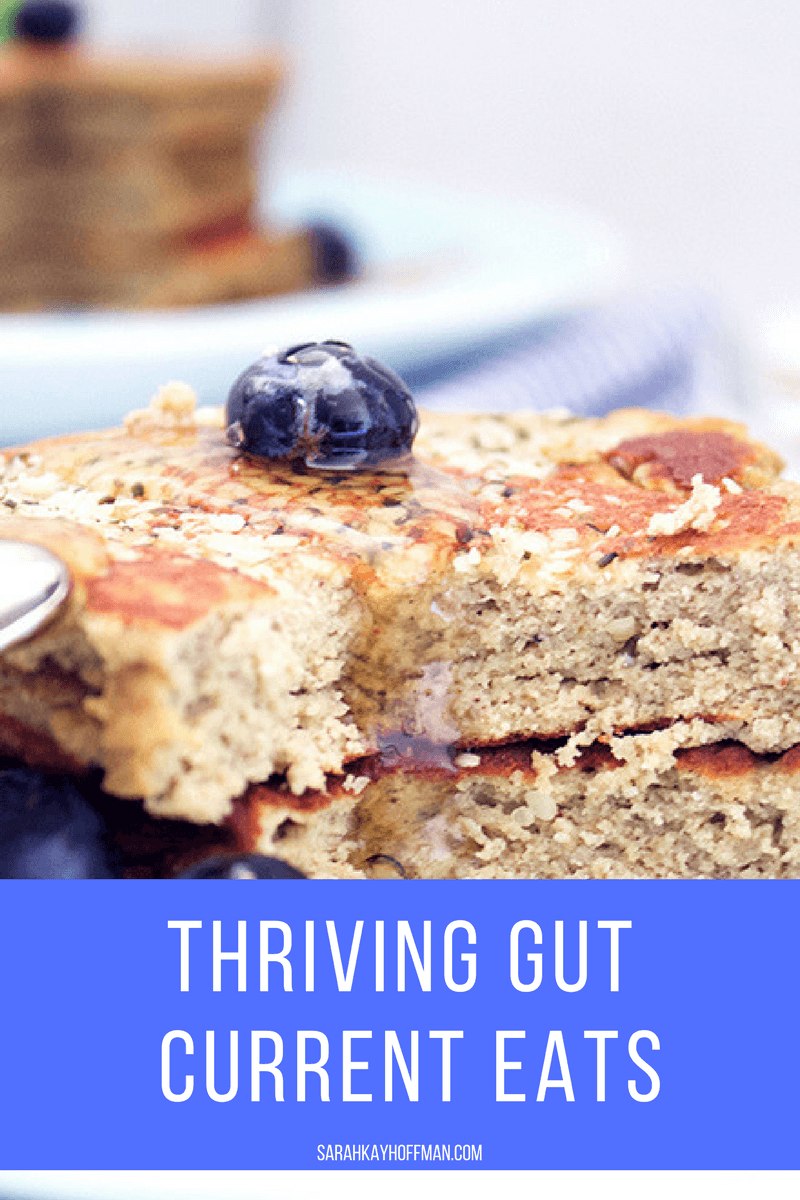
![Best Supplements for Detox [gut + skin, Episode 70]](https://agutsygirl.com/wp-content/uploads/2023/01/ep-70-featured.png)
I can eat pumpkin, zuchinni, squash, and sweet potatoes happily! I grieve at all the cauliflower crust I’ll never get to indulge in. (well at least til my gut heals..)
Cruciferous are my fav but can cause tons of gas. Sometimes gut cramps. Same with cabbage. I don’t eat pumpkin or zucchini as they are high lectin foods per my doc and have to avoid spinach because of oxalate issues 🤪. I do well with carrots grated with chopped romaine and a tiny bit of the others. So hard for me to find a balance of healthy good foods to eat which adds to my frustration and fatigue. Need s personal private chef 👩🍳
Ps: I sometimes will make zucchini noodles without the skin and seeds of course and seem to do okay with those. Craving a pumpkin latte about now, LOL.
So good! Yeah, I have yet to have a PSL. I’m totally basic like that.